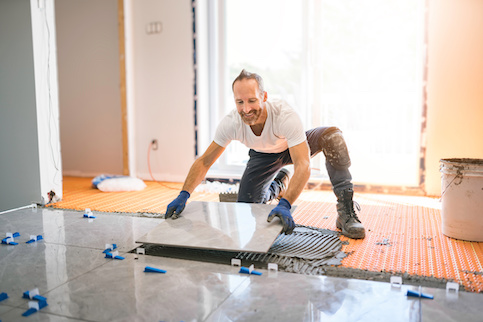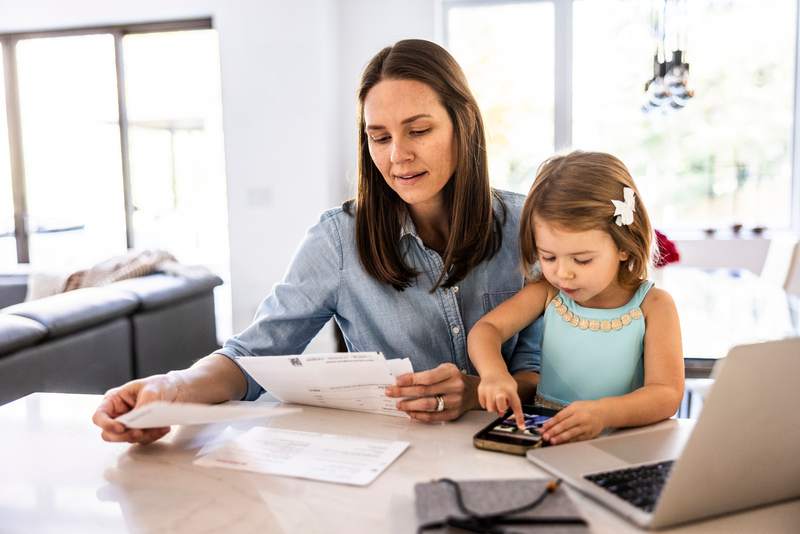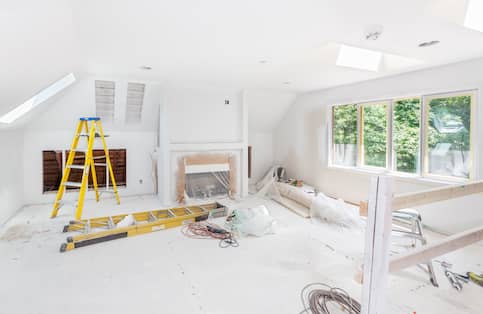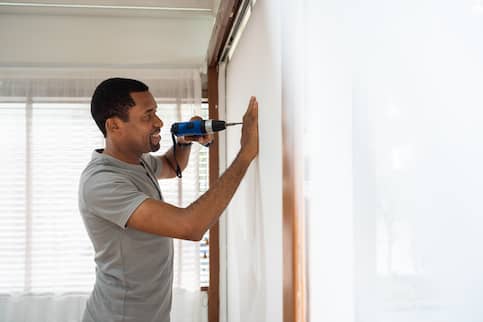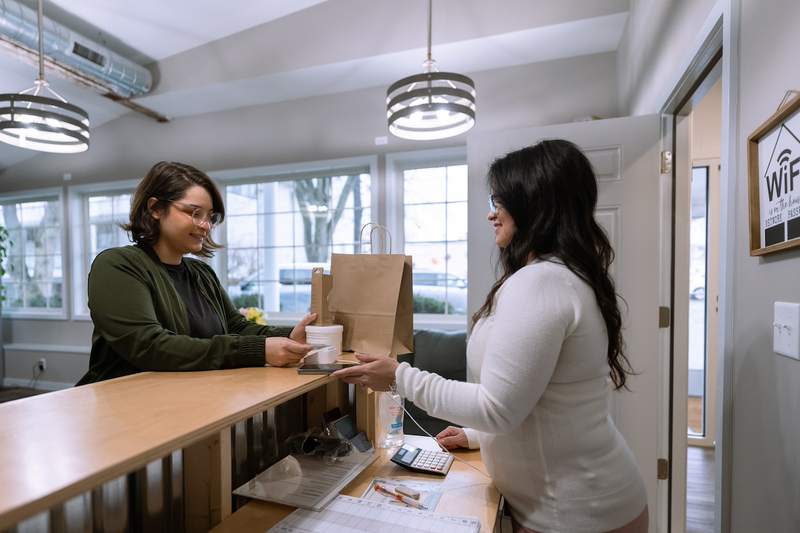A dream house isn’t just about your decor color palette and welcoming curb appeal, but it’s about peace of mind in the place you call home. And every homeowner, including the millions of Americans with disabilities, should be able to love where they live.
Homes with narrow doorways and steps can limit the use of mobility aids, while high kitchen counters can impact independence. It’s not always easy to find accessible housing that accommodates your specific needs, and costly renovations aren’t always feasible for families that rely on disability benefits.
However, grants are available for disabled homeowners to build houses or fund renovations that serve them and their needs. Whatever your requirements, certain financial resources can help you create a dream home that’s safe and comfortable.
Home Improvement Loans And Grants For Disabled Homeowners
Let’s take a look at the different loans and home improvement grants that disabled homeowners can take advantage of.
Federal Housing Administration’s (FHA) 203(k) Loans
The FHA 203(k) loan program allows home buyers and homeowners to fund repairs to an existing home that’s at least 1 year old. The loan must be at least $5,000, and it can be as large as the total value of the home, including anticipated rehabilitation.
Funding:
- $5,000 minimum up to the total home value or 110% of the after-repair value (ARV)
Eligibility:
- Bundling of mortgage or refinance and rehabilitation costs into one loan
- The home being at least 1 year old
Homeowners looking for a smaller home repair can apply for assistance through the FHA’s limited 203(k) program, which offers loans of up to $35,000.
These loans can cover accessibility improvements to a home, as well as general upgrades that include overall modernization, landscape work, structural repair and energy-efficiency standards.
Homeowners can apply for assistance through any FHA-approved lender.
Self-Sufficiency Grant
The nonprofit Modest Needs organization provides aid for individuals and families who live just above the poverty line and often don’t qualify for other social assistance programs.
Funding:
- Average assistance: $750 – $1,250
Eligibility:
- Primary income that preferably comes from employment, child support, veteran’s benefits or retirement
- At least one household member being employed
This grant is often awarded to families struggling with either of these expenses:
- Emergency expenses: If a family is living paycheck to paycheck, this grant can cover a variety of needs, including medical bills, housing expenses and even legal fees.
- Unpaid monthly bills: This benefit can help families stay afloat if they’re experiencing extenuating circumstances, such as having to leave work for an extended period of time or dealing with an emergency expense like an insurance deductible that strains their finances.
Self-sufficiency grant values are determined by individual need and household income. The average grant awards $750 – $1,250 to applicants, and applications can be funded in 10 – 14 days.
Rural Housing Repair
The United States Department of Agriculture (USDA) provides single-family housing repair loans and grants through its Section 504 Home Repair program.
Funding:
- Maximum loan: $40,000
- Maximum grant: $10,000
Eligibility:
- Ownership of your primary residence
- Lack of other affordable credit options
- An income less than your county’s “very low income” limit
- For grants, being age 62 or older
Very low income homeowners may qualify for grants to repair their homes, and elderly homeowners within the stated income limits can receive grants to remove health and safety concerns.
Loans are provided at 20-year terms and include a fixed interest rate of 1%. Requirements may vary by location, so contact your state office for additional information.
Rebuilding Together
Rebuilding Together is a national nonprofit with affiliates throughout the United States. Each affiliate shares the mission to repair homes, revitalize communities and rebuild lives.
Eligibility:
- Varies by local affiliate
- Earnings of less than or equal to 80% of the local median income
Rebuilding Together’s primary goal is to provide safe and healthy housing repairs. Local affiliates also assist their communities by improving neighborhood safety, connections and accessibility.
These organizations complete around 10,000 projects a year to assist people in need in 39 states.
Housing Improvement Program
Grants through the Housing Improvement Program are provided by the Bureau of Indian Affairs to benefit Native American homeowners who live in tribal service areas.
Funding:
- Health and safety repairs: $7,500
- Building code renovations and repairs: $60,000
Eligibility:
- Membership in a federally recognized indigenous tribe living in an approved area
- Income that doesn’t exceed 150% of the federal poverty guidelines
Funds may be used to repair and renovate existing homes or contribute to new housing costs. While grants don’t exclusively benefit people with disabilities, they do increase safe and accessible housing for Native Americans and Alaskans.
Housing Choice Voucher Homeownership Program
The Department of Housing and Urban Development (HUD) provides the Housing Choice Voucher (HCV) homeownership program to help disabled Americans become first-time homeowners. This voucher helps cover the cost of buying a home, as well as ongoing homeownership expenses, through monthly payments.
An HCV family must meet income requirements (unless receiving disability compensation), be a first-time home buyer and complete required housing education programs provided by their local Public Housing Agency.
See What You Qualify For
Buy A Home
Discover mortgage options that fit your unique financial needs.

Refinance
Refinance your mortgage to have more money for what matters.
Tap Into Equity
Use your home’s equity and unlock cash to achieve your goals.
Home Modification Grants For Disabled Veterans
Around 27% of U.S. veterans have a service-related disability. In sharp contrast, only 12% of civilian noninstitutionalized Americans live with a disability.
Several nonprofits and federal services work to provide accessibility aids for these veterans. The Department of Veterans Affairs provides more than VA loans, offering a Specially Adapted Housing Program with five housing grants for veterans and service members with service-related disabilities.
Specially Adapted Housing
The largest VA-provided grant, the Specially Adapted Housing (SAH) grant can go toward home construction or modification to achieve barrier-free living.
Funding:
- $101,754
Eligibility:
- Must be a veteran or service member with a qualified service-related disability
These funds also come with some of the greatest restrictions and are only available to veterans or service members with these disabilities:
- Loss of use of both legs
- Loss of use of one leg and organ disease, or loss of use of one arm
- Blindness in both eyes
- Loss of use of both arms at or above the elbow
- Severe burns
Special Housing Adaptation
The Special Housing Adaptation (SHA) grant is designed to increase mobility in an existing home. This grant can be used up to six times and is accessible again if the full amount isn’t used within a year.
Funding:
- $22,036 for fiscal year 2023
Eligibility:
- Must be a veteran or service member with a qualified service-related disability
Eligible service members or veterans must have one of the below service-related disabilities:
- Loss of use of both hands or arms below the elbow
- Severe burns
- Some respiratory or breathing injuries
Temporary Residence Assistance Grant
The SAH and SHA grants are also available for veterans or service members temporarily living with a family member and needing funds to improve their home’s accessibility and mobility.
Funding:
- Specially Adapted Housing: $40,983
- Special Housing Adaptation: $7,318
Eligibility:
- Must be a veteran or service member with a service-related disability
- Must be temporarily living with a family member
Home Improvements And Structural Alterations
The Home Improvements and Structural Alterations (HISA) grant provides assistance to service members and veterans with disabilities, regardless of the cause.
Funding:
- Service-related disabilities: $6,800
- Non-service-related disabilities: $2,000
Eligibility:
- Must be a veteran or service member with a disability
Those with eligible service-related disabilities may combine this grant with an SHA or SAH grant to increase their home modification funds.
Veteran Readiness And Employment
Unemployed veterans and service members may be eligible for a Veteran Readiness and Employment (VR&E) grant, formerly known as the Vocational Rehabilitation and Employment grant.
Funding:
- $93,356
Eligibility:
- Must be a veteran or service member who can’t work due to a service-related disability
- Must require adaptations for independence at home or in the community
These funds are designed to improve independence and accessibility at home, although home adaptations must be approved for funding.
Fund your renovations with a cash-out refinance.
See what you qualify for!
Local Resources For Disabled Homeowners
In addition to federal resources, local and state departments also provide aid for disabled homeowners. These benefits may include buying assistance, grants for renovations, and health and safety improvements.
To find resources in your area, explore:
- State and city housing agencies
- State and city health and social services departments
- Your state’s Department of Housing and Urban Development (HUD)
You can also look for local nonprofits that can help. Your state and city agencies may have information on these organizations, or you can explore online charity guides for your metropolitan area.
Local affiliates of national organizations like Habitat for Humanity also provide home repair services that disabled homeowners may be eligible for.
Additional Resources For Disabled Homeowners
Here are additional resources that disabled homeowners may find helpful:
- American Association of People with Disabilities: Advocacy and resources
- Disability Benefits Help: Resources and advice for Social Security recipients
- Fair Housing Act: Defines housing discrimination based on disability and reporting resources
- HHS: Health care resources for people with disabilities
- Independent Living Centers Directory: Lists community-based state agencies operated by people with disabilities
- National Disability Institute: Financial and employment tools
- National Organization on Disability: Employment resources and initiatives
- The Arc: Advocacy and housing for people with disabilities
- USA.gov: Caregiver support and funding resources
- U.S. Department of Transportation: Resources for accessible transportation
Grants For Disabled Homeowners: FAQs
Homeownership can present some unique challenges when you have a disability, and those challenges may include accessibility and funding. Here’s some additional information aimed at helping you renovate or buy a home.
How is disability defined?
The CDC defines a disability as any physical or mental condition that limits how somebody participates in activities or interacts with others. The legal definition of “disability” clarifies that this condition must significantly impact one or more major activities.
Organizations that award grants for disabled homeowners will have their own definitions for disability and use that reference to determine appropriate aid.
What other home improvement grants are available?
Local and federal government agencies provide a variety of grants for homeowners to improve their property. Grants are available to fund sustainability improvements, historic properties, and health and safety.
Several grants are also awarded based on demographics and affiliations. These include grants for veterans, low-income families and ethnic groups. Consult your city agency and explore local housing nonprofits.
How can I apply for home improvement grants?
Most home improvement grants and loans will have a space for you to apply on their website. If you’re looking for assistance with buying a home, consult your mortgage lender about available grants and how to qualify.
Are home loans available for people with disabilities?
The Housing Choice Voucher homeownership program helps cover home buying and homeownership costs for eligible first-time home buyers, including those with disabilities.
Other types of home loans, including conventional, FHA, USDA and VA loans, can also help Americans with disabilities become homeowners.
Looking For Access To Money?
Just answer a few simple questions and we’ll help you find the funds you need for your home improvements
The Bottom Line: Grants For Disabled Homeowners Can Make Renovations Possible
Safety and comfort are top priorities for every homeowner, and disabled homeowners are especially vulnerable to hazards at home. Government and nonprofit agencies provide numerous grants to help these homeowners gain independence through increased mobility and accessibility.
Whether you’re looking to build a custom home or renovate your existing house, resources are available to meet your needs without you having to take out a new line of credit or strain your finances.

Matt Cardwell
Matt Cardwell is a Staff Writer for Rocket Companies. During his nearly 15 years with Rocket Mortgage, Matt has occupied a diverse array of marketing leadership roles, including leading and growing the company’s early digital and internet marketing efforts; Editor-in-Chief of the Rocket Publishing House; Vice President of Marketing; Director of Social Media; and Director of Business Channel Strategy. Matt was also an operating partner at Rockbridge Growth Equity, a Detroit-based private equity firm.
